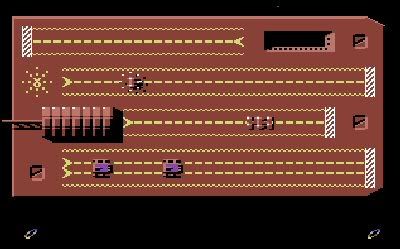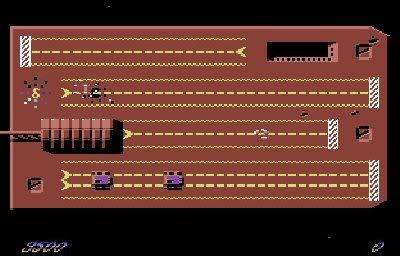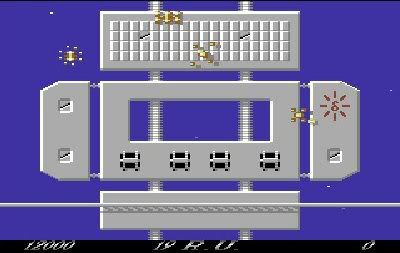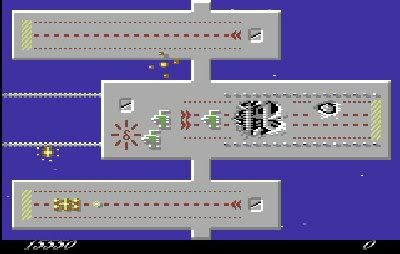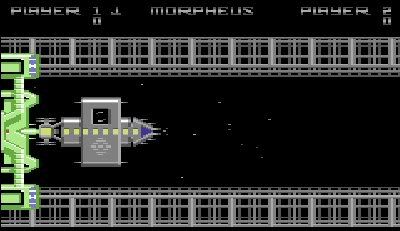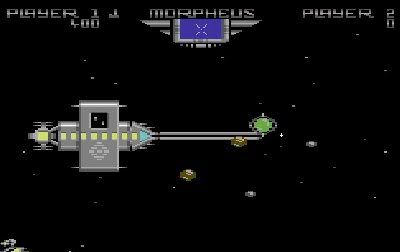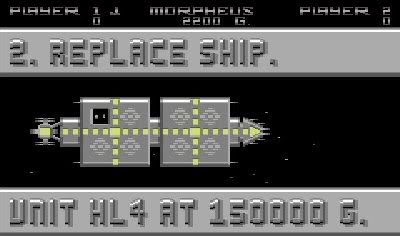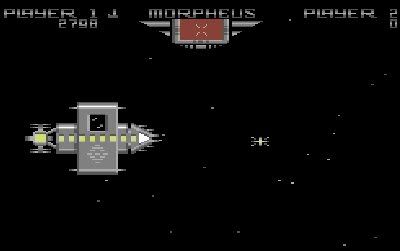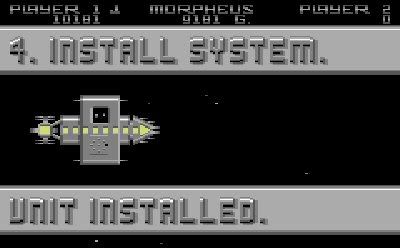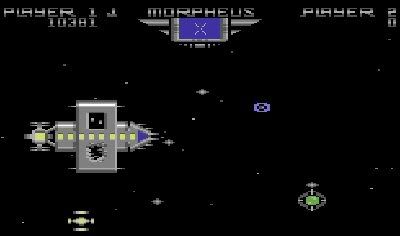Being a World Record holder can be a massively prestigious thing. Who wouldn't want the fame and glory that comes with being Usain Bolt, running the 100 metres in 9.58 seconds? Or how about Feliks Zemdegs, who can complete a Rubik's Cube in an amazing 6.65 seconds? Maybe you'd prefer the prestige that comes with being Joey Chestnut, eater of 68 hot dogs in 10 minutes? Actually, on second thoughts I think I could do without that one.
 Wow. Doesn't that look like a lot of fun?
Wow. Doesn't that look like a lot of fun?I'm not a great athlete... being school champion at the triple jump hardly counts. I hate puzzles, we all know that. And although I'm getting a bit of a kite on me as I tap forty on the shoulder, I'm not really that big an eater. Video games, though, are my thing. And there are
tons of video games out there. Surely getting a World Record on one of them must be easy? And then you could genuinely say you're a World Record holder. That would be cool.
Now, there are games out there where you've got no chance. I'm no Billy Mitchell or Tony Temple... the real classic records simply aren't attainable for me. But I do have a fairly vast experience of gaming over the last thirty-odd years... and there is one game I always thought I was quite good at. That game is
Yie Ar Kung-Fu.
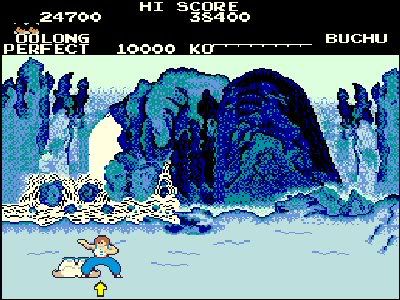 Down you go, fat boy.
Down you go, fat boy.I first used to play
Yie Ar Kung-Fu regularly at the YMCA in Consett, of all places. It was a cool place, the "YM". They held roller discos for the teens in the area, and they had a few arcade machines in there, most memorable of which was
Tron. That was a lovely machine. I was never much good at it, though. Around another corner, however, was
Yie Ar Kung-Fu. And that one, I WAS good at.
It's an interesting game, is
Yie Ar Kung-Fu. If you haven't heard of it, it's a beat 'em up that puts you in the shoes of protagonist Oolong, who must fight his way, one-on-one, past eleven different and increasingly difficult enemies. Each enemy has his (or her) own fighting style, and in many cases, they have weapons too. Should you be good enough to beat all eleven, then you'll go back to the first... but they're all better and harder second time around...
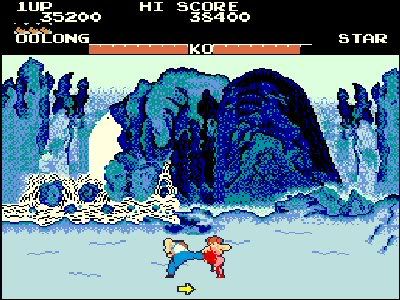 I was taught never to hit a girl. So I'll kick this one instead.
I was taught never to hit a girl. So I'll kick this one instead.OK, so
Karate Champ came first. And if you look at that game, you can see that it led to games such as
Way of the Exploding Fist and
International Karate. But
Yie Ar Kung-Fu is really the grandaddy of fighting games as we know them today. It deserves our respect on that front. To many, it's an irritating game... to me, it's something of a joy. I can't get on with modern fighting games; there are too many moves, too many commands to input on the controller.
Yie Ar Kung-Fu gives you sixteen moves; eight kicks and eight punches, accessed by the eight directions on the controller and one of two buttons.
I can manage that, and I've always been able to. Even from the beginning, I had something of an affinity with the game, and regularly saw myself defeating opponent after opponent and reaching the final bad guy, Blues. He's a tough nut, but after practice I found I could beat him fairly often, albeit after losing a few lives in the process.
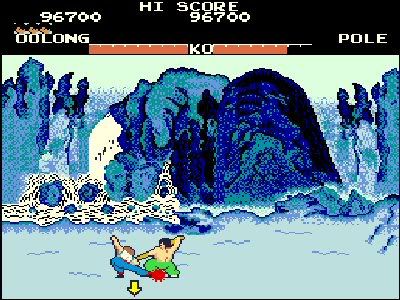 This very game here was the first time I'd ever had a Perfect on Pole.
This very game here was the first time I'd ever had a Perfect on Pole.That's the key... having a good supply of extra lives. To get these, you'll need to score points... and to boost your score, you can get Perfect ratings on each opponent. This is, in many cases, easier said than done. "All" you have to do is defeat an opponent without taking a hit yourself... almost impossible against some fighters. Defeat the first opponent, the fat man Buchu, without getting hit and you'll score a 10,000 bonus. This "Perfect" bonus increases by 10,000 with every fighter. Work that out, and you'll see that over the eleven fighters, there's a pretty big score to be had... if you can master them.
So that's what I set about doing. Now, I know that back in the Eighties I could score over 600,000 points, which I always thought was pretty good. Then I kind of forgot about it for a lot of years, until the wonder that is MAME enabled me to play it again. And I played it quite often for fun, not thinking any more of it, until I played it in a competition on a gaming forum. There, I scored 890,000 points... certainly my best. That's when somebody asked me what the World Record was.
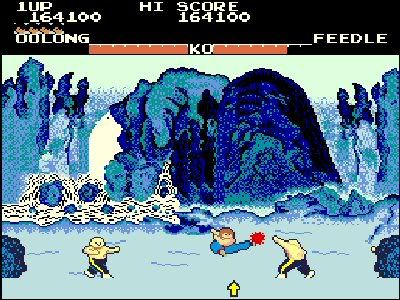 And this one, who looks easiest of all, always manages to get a hit on me. Bastard.
And this one, who looks easiest of all, always manages to get a hit on me. Bastard.I had no idea. The thought had never crossed my mind. I knew there was a website for such things... the fabled Twin Galaxies. But for some reason, I'd never looked the game up there. When I did, I was quite surprised.
The World Record for
Yie Ar Kung-Fu on an actual arcade machine was around 600,000. On MAME, it was about 470,000. I'd beaten both of those scores, and quite comfortably! So it was settled. I was going to go for a World Record! Roy Castle would have been proud.
Of course, merely getting a World Record score is not enough; you have to accompany it with evidence. That might be tricky if I owned an original arcade machine, but it's easy in the days of emulators... they all have built in recording functions. What does make it a bit trickier is that you must submit your score on Twin Galaxies' accepted version of the game.
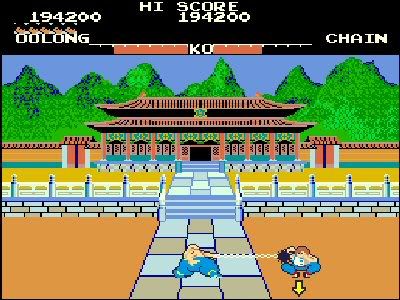 See, now that's GOT to hurt.
See, now that's GOT to hurt.If you don't know about emulation, then you won't know that it's constantly being refined and updated. Games are made to run more accurately as time goes by, which is great but can be a bit of a faff on at times. There have been well over 100 revisions to the MAME (Multiple Arcade Machine Emulator) program since it started. Twin Galaxies wants to be fair to all, and so they use a version of the program called WolfMAME, and it must be version 0.106. It took me ages to locate this particular version of the program and the game ROM to go with it!
Once I had everything I needed, though, the matter of setting about my task was simple. Hit the emulator's record button, start the game, kick and punch. I had a couple of warm-up games just to jog my memory, but it was obvious that all my old routines were easily called back into memory. And so it was that on March 24th 2008, I achieved a score of 610,300. Decent enough, if nowhere near my best, but certainly enough to be a new World Record! Not only that, but it beat the arcade version's high score too. I was happy with that, so instead of playing more and getting a much more daunting high score, I submitted my new World's best.
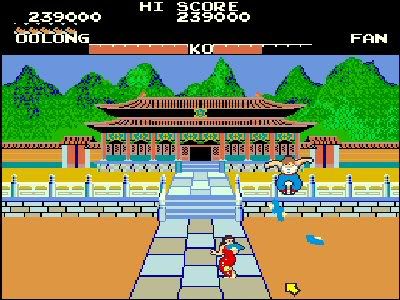 When they said I'd meet a Fan, I didn't think...
When they said I'd meet a Fan, I didn't think...You wouldn't think it, but the wait between submitting your score and it being verified and posted on the site is excruciating. You can't stop yourself from checking every day, even if you know they're busy. All sorts of questions float around in your mind. What if they've found something wrong with my game? What if someone else has submitted a better score in the meantime? The possibility that you might not see your name in lights after all is a worrying one.
It took about a month for my score to be verified and them to hit the website. It felt a bit weird to see it there, with a number "1" next to it, but that was that. I was a World Record holder. Roy Castle would have been proud. And although it was on a game that was relatively insignificant in the arcade world, I was proud too.
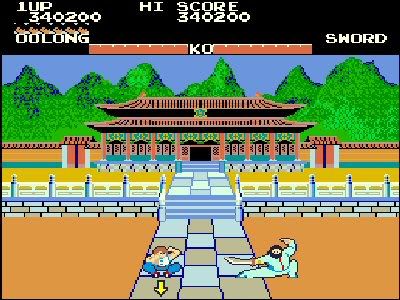 Bloody hell! You can keep that thing away from me, mate!
Bloody hell! You can keep that thing away from me, mate!Sadly, it didn't last, and withing a few short months some git, erm, I mean some gaming Titan had beaten my score. They'd only managed 679,000... a score I could have beaten comfortably if I'd kept practicing instead of submitting the first effort that counted. But that was that, and I felt a bit deflated. That's not the attitude of a champion. Then I heard of another gaming world records site, called MARP. I thought I'd have a look at that one and see what their best was... and was staggered to find it stood at 9,999,900.
How could that be? All this time, I thought I'd been half-decent at the game. When I saw that, I wondered, what was the point of trying again? I simply couldn't fathom how you could manage a score like that. I really struggled with the game, second time around. Had other players found an exploit and could play it forever, beating all opponents with a single move? I was defeated. I put all thoughts of high scores to the back of my mind...
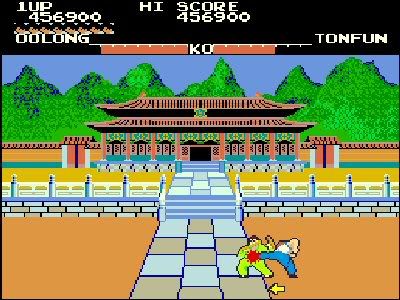 This bloke's pretty hard. I'm not ashamed of kicking him in the back.
This bloke's pretty hard. I'm not ashamed of kicking him in the back....until the much-maligned Game Room was released on the XBox 360. One of the few companies to sign up was Konami, producers of
Yie Ar Kung-Fu. I'd already bought it on the 360, but I forked out again to add it to my impressive arcade collection. Despite using a less-than-ideal controller, I had the top score on the Game Room when I first bought it, and uploaded my replay. But when I checked again a couple of days later, the high score was... 9,999,900.
I was gutted. How could there be so many people out there that were SO good at this game? I thought it was really hard! But then I remembered that a feature of Game Room was that it allowed you to watch replays from the top 20 players. Finally I'd get to see some of the techniques of the world's top players. So I loaded up the number one score and watched. Huh, they didn't even get a Perfect on Buchu, the first opponent! Oh well, you only get 10,000 points for that, and anyone can slip up. On to Star, next...
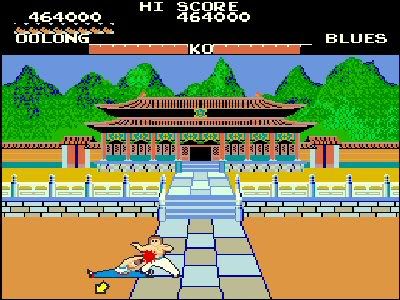 Here's the daddy of them all, Blues. Get in and out quick, or you're dead.
Here's the daddy of them all, Blues. Get in and out quick, or you're dead.And then that's when it hit me, with all the force of Keyser Soze's unveiling in The Usual Suspects. These amazing players, the ones that had clocked the game, were merely reaching the second opponent and then kicking her stars for points! I honestly couldn't believe it. Why would you bother to play a game without actually playing the game? All those MARP high scores must have been achieved the same way!
I was heartened by that. None of those scores would count on Twin Galaxies, and so my opportunity was there again! And then it was derailed by the arrival of our second child, Ryan. And then I just forgot. Excuses, excuses. But now I'm ready. I'm focused. And I want my record back. I'm going for it. Stay with me gang, and I'll let you know when it happens...
















